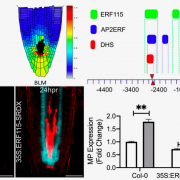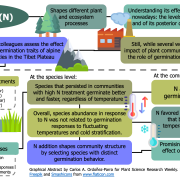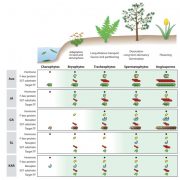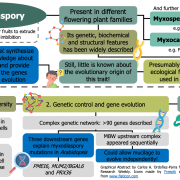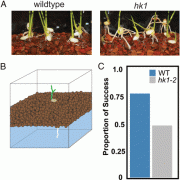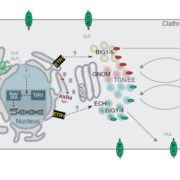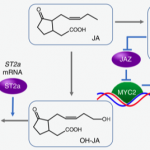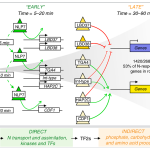DRT111/SFPS splicing factor controls ABA sensitivity during seed development and germination (Plant Physiol)
 Abscisic acid (ABA) acts on different plant physiological and developmental processes by quite complex mechanisms. In fact, some of these processes interact with light signaling and some are controlled by alternative splicing. In this paper, Punzo et al. show that DRT111 – a splicing factor previously described in photomorphogenesis – regulates seed responses to ABA. The authors found that the germination of the two DRT11 knock-out mutants decreased after exposing their seeds to ABA, meaning the seeds were hypersensitive to ABA. To explain this phenotype, the authors analyzed the seed transcriptome of the drt111-2 mutant and found an up-regulated expression of PIF1 and SOMNUS, two transcription factors that inhibit germination. Interestingly, PIF1 is a transcription factor involved in light signaling pathways, showing that DRT111 affects the crosstalk between ABA and light signaling. Also, they found drt111-2 seeds accumulated ABI3-β –the non-functional, alternatively-spliced transcript of the germination inhibitor ABI3. Given this, the study shows that DRT111 also controls the alternative splicing of ABI3. (Summary by Carlos A. Ordóñez-Parra) Plant Physiol. 10.1104/pp.20.00037
Abscisic acid (ABA) acts on different plant physiological and developmental processes by quite complex mechanisms. In fact, some of these processes interact with light signaling and some are controlled by alternative splicing. In this paper, Punzo et al. show that DRT111 – a splicing factor previously described in photomorphogenesis – regulates seed responses to ABA. The authors found that the germination of the two DRT11 knock-out mutants decreased after exposing their seeds to ABA, meaning the seeds were hypersensitive to ABA. To explain this phenotype, the authors analyzed the seed transcriptome of the drt111-2 mutant and found an up-regulated expression of PIF1 and SOMNUS, two transcription factors that inhibit germination. Interestingly, PIF1 is a transcription factor involved in light signaling pathways, showing that DRT111 affects the crosstalk between ABA and light signaling. Also, they found drt111-2 seeds accumulated ABI3-β –the non-functional, alternatively-spliced transcript of the germination inhibitor ABI3. Given this, the study shows that DRT111 also controls the alternative splicing of ABI3. (Summary by Carlos A. Ordóñez-Parra) Plant Physiol. 10.1104/pp.20.00037
[altmetric doi=”10.1104/pp.20.00037″ details=”right” float=”right”]


